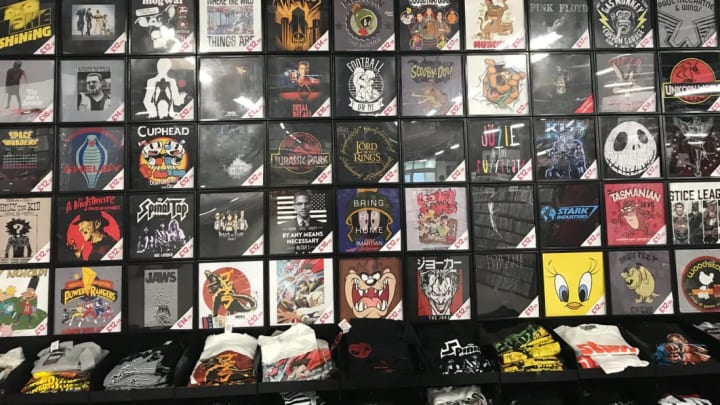Harrison Cutler wasn’t having any of it. It was September 1966 and Cutler, who was the manager of the California State Fair, was patrolling the grounds looking for any sign of a booth peddling iron-on decals, those printed plastic slabs that can be affixed to a T-shirt simply by ironing over them.
The iron-on decals being offered at the fair were, according to Cutler, too lurid for the family-friendly event, with slogans like “Photographers Are Well-Developed” proving to be a big hit. So he asked a concessions manager to round up the offending decals so that he could put his foot down with the proprietors.
“If you find one damn shirt like these on the grounds today,” he told his employee, “close ‘em down.”
In the 1960s and 1970s, iron-on decals were a hot fashion trend among teens and young adults. They offered an easy way of customizing clothing and offered a sense of accomplishment. With one swipe of a hot iron, ink would instantly be transferred from heat-resistant paper to a plain shirt. (The heat from the iron finished curing the ink, and worked best on 100 percent polyester or cotton/polyester blends.) The garment could be immediately transformed into a messaging device for a pop culture character, a slogan, a promotional tool, or something totally irreverent. The transfers could be found in a variety of places: In newspapers, on cereal boxes, via mail order, and, unfortunately for Cutler, at state fairs. (Some companies even embraced their ability to double as a billboard. In 1977, McDonald’s offered a free cheeseburger to anyone sporting a Ronald McDonald iron-on.)
For a generation weaned on Woodstock, Mad magazine, and mind-altering substances, the decals were also a form of artistic expression. One of the major iron-on transfer distributors was RoAcH Studios, which was opened in 1962 by brothers Russ and Dennis Roush. RoAcH started out catering to car and hot rod enthusiasts, advertising T-shirts in car magazines. When partner Stan Peterson came aboard in 1966, they branched out into iron-ons, which meant they could create T-shirts on demand for customers while carrying a small inventory. The transfers were also sold direct-to-consumer.
“Iron any of these super wild designs on your own shirt in just one minute,” read one 1973 ad. “All colors are 100 percent fade proof and washable!”
RoAcH offered everything from Marvel characters like Captain America and Spider-Man to David Cassidy to counterculture idioms like “Keep On Truckin’.” Other companies peddled decals with slogans like “Nurses Call the Shots” or “Kid for Rent.”
The shirts and decals made use of art from underground artists like Ed Newton, Robert Williams, and R. Crumb. A competitor, Ed Roth, had tremendous success with his Rat Fink design, a stylish, slightly fierce-looking rat that became a symbol of hot rod culture. The RoAcH decals were advertised in comics and sold at T-shirt shops, which began to spring up around the country and offered a high-heat pressing right in the store. By 1978, Roach was doing $20 million annually in gross sales.

Both Roach and the transfers remained viable through the 1980s, though licensors began taking a harder stance on the designs. They wanted more control over the apparel business than an iron-on, which could be attached to anything, could provide. With fewer designs to choose from, RoAcH's business waned and closed up in 1987 before re-opening in 2010.
Iron-ons are more of a nostalgic product these days, as T-shirt and apparel companies can offer just about any overt or obscure reference under the sun. But for a generation of ‘70s kids, there was something special about making their own statement—provided their parents let them use the iron.
